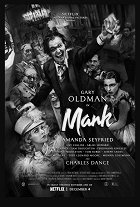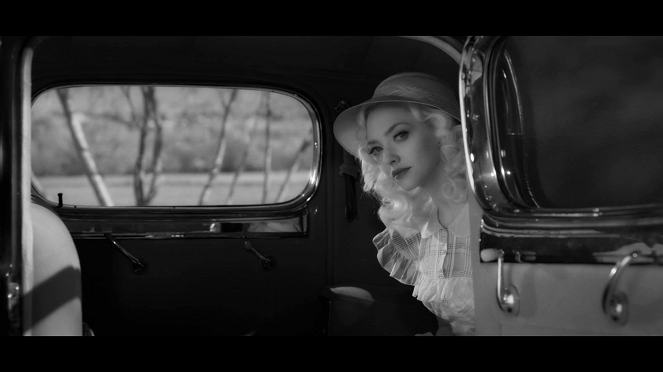Directed by:
David FincherScreenplay:
Jack FincherCinematography:
Erik MesserschmidtCast:
Gary Oldman, Amanda Seyfried, Lily Collins, Charles Dance, Tom Burke, Joseph Cross, Tuppence Middleton, Leven Rambin, Tom Pelphrey, Arliss Howard (more)VOD (1)
Plots(1)
1930s Hollywood is reevaluated through the eyes of scathing wit and alcoholic screenwriter Herman J. Mankiewicz as he races to finish Citizen Kane. (Netflix)
Videos (2)
Reviews (14)
A formally precise and linguistically exquisite picture about the writing of the screenplay for Citizen Kane. Unfortunately, apart from context of that period, it offers nothing new. Filming according to his father’s screenplay, Fincher nurtured all aspects of this heart-felt project and the way he presents the topic in the style of a forties movie is very appropriate. You can’t tell the difference. The actors are great down to the last one. The music is perfect: Reznor and Russ are brutally moderate, obediently serving the story. But it was strange to listen to Trent’s typical piano playing in a movie that clearly must have been filmed eighty years ago...
()
A sea of name dropping, perfectly executed visuals, but emotionally speaking, Mank only barely whispered to me here and there, rather than speaking to me coherently. It is the completion of a homework assignment for me and David Fincher, saved from downfall primarily by its unintentional thematic relevance.
()
Mank attracts viewers primarily through its unraveling of the tangle of influences that led the title character, an alcoholic screenwriter, to write the celebrated Citizen Kane. However, the actual writing of that screenplay plays second or rather third fiddle in Mank, as there is no depiction of the classic’s shooting, the great Tom Burke as Orson Welles appears on screen for a total of maybe three minutes, and Mank isn’t very faithful to the historical facts; for example, it presents Welles’s involvement in the drafting of the screenplay in accordance with myths that have long since been debunked. In fact, Mank is rather generally focused on the workings of Hollywood in the 1930s and during the Great Depression, and to roughly the same extent it deals with the political mood of the time and the affair involving the 1934 California gubernatorial race, which is understandably not much of a draw for viewers. But that’s not the problem. Rather, the problem is that none of this is rendered in a very engaging way. Though I fully understand Fincher’s desire to make a film based on his father’s long-shelved screenplay, that screenplay is unfortunately about uninterestingly written and poorly defined characters who frequently deliver witty and precisely aimed lines, but what good is that when there is no one to build any kind of relationship with on the screen? Furthermore, the second half of the film fundamentally loses traction and, with the exception of a drunken scene at a fancy-dress dinner party, it doesn’t contain much that’s remarkable. Tim Burton's Ed Wood, for example, was made with a similar intention and turned out much better. Mank is also related to Citizen Kane in its attempt at an audio-visual retro-form, which, though impressive, is not in any way consistent (after all, it was shot in widescreen digital), with a complicated narrative structure full of flashbacks (which are rather oddly skipped between in places) and a lot of different allusions (visual quotes, references to sleds and rosebuds, for example). Therefore, it is definitely necessary to see Citizen Kane before watching Mank. And though it’s fortunately not entirely necessary, it helps to know something about the key figures of Hollywood society at the time.
()
"WhY dOEsN’t FiNCher MaKe aNoTHeR Se7en?!?§" the movie. A work hardly applicable in a non-American environment (god, just the idea that it has Czech dubbing or subtitles in the usual Netflix quality), for which one can't be mad at Jarmila Střížkova here for absolutely not knowing where its head is at. In our confines, then, it's mainly a problem that among the mainstream cashless-market critics, there is no one who has the will to interpret and articulate the film to the local viewer, used to boredly clicking through the endless Netflix offerings in his sweatpants on the couch to see if there is anything else capable of engaging him. We all laughed at the Spáčilová until we discovered that there never was a Spáčilová, it was always just us. The absence of Mank from theaters is one of the most unfortunate things to happen this year.
()
David Fincher is one of the greatest directorial aces and has long since established a position where we know that anything he makes will be at least interesting, and Mank is no exception. However, I suffered quite a bit as a viewer with it. This trip to 1940s Hollywood is no doubt a good film, and the depiction of the era, the politicking of the studios, and the life of a screenwriter who, though he drank a lot, could be all the more honest, is definitely worth watching, even if I was bored from the halfway point on. All those objective and technical qualities I can understand and subscribe to, Fincher knows what he's doing and he does it damn well. It's just that this time he didn't hit the mark for me in theme or indeed form. I simply didn't enjoy watching his new film. And he didn't want to make it any easier. Great atmosphere, a perfect Gary Oldman, great sets and music, but behind all that is the all-too-ordinary story of an all-too-ordinary man. I expect something more progressive from Fincher. Maybe, since he was directing his late father's script, he wanted to keep himself a little bit in check. I could understand that, but I'm not sure it was worth it.
()



Ads